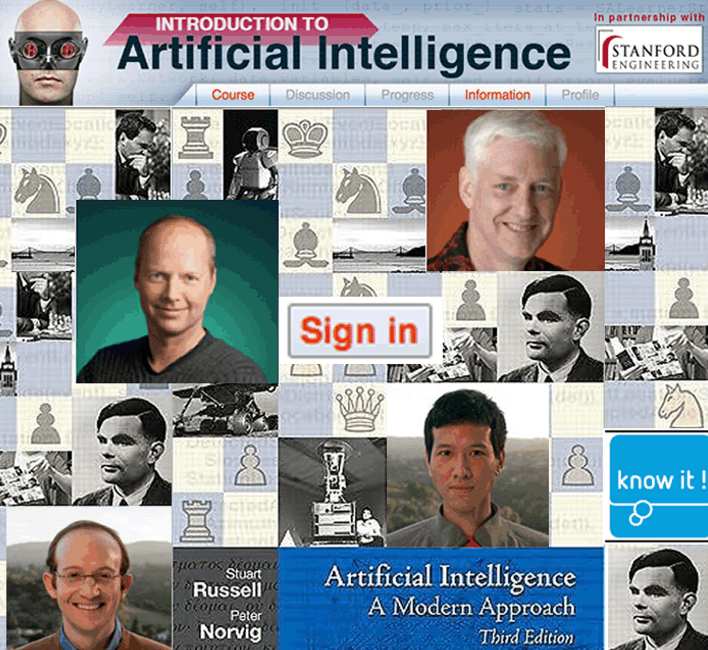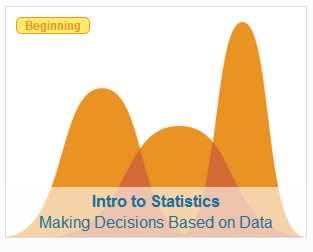| On Statistics and Open Education: A Brief Chat with Sebastian Thrun |
| Written by Jacqueline Spiegel | |||
| Friday, 15 June 2012 | |||
Page 1 of 2 Udacity is launching its third crop of university-level courses and Sebastian Thrun has an ambitious aim for his Intro to Statistics course. He explains to us why this course should be on our to-do-now list and when we can look forward to complete Computer Science degrees from Udacity. A couple of days ago I had the pleasure of a virtual chat with Professor Sebastian Thrun for an update on Udacity as it enters into its third “hexamester” with a fourth round of course offerings that started less than a year ago.
Sebastian is on (yet another) mission – to enroll students in his new class "Intro to Statistics Making Decisions Based on Data” in such numbers that it tops the AI Class enrollment, which itself weighed in at a top heavy 160,000 strong. He just might do it. And truth be told, I am on a mission to help him do it. I am a Thrun Evangelical (as all of us 23,000 AI Class grads are), here to tell you, if you have missed AI Class, or the first instantiation of Robotic Car, there is nothing as exciting as taking a class with Sebastian the very first time he is teaching it. And although all Udacity offerings are free, you will pay – with your own time, sweat equity and investment. There is nothing quite like the Udacity Hexamester after-final party. Quite the rush. Are you ready for the challenge? Programmer to programmer (and in the case of Statistics, Programmer to S.T.E.M- Science ,Technology, Engineering, and Mathematics - vested individual) – the only way to hear Sebastian is to let Sebastian do the talking – and so I shall.
But by way of disclaimer I will first fully admit that I am the wrong person to interview Sebastian Thrun, because I am hardly unbiased. In August 2011 when the New York Times published the article “Virtual and Artificial, but 58,000 want the..”, FREE, “…Course” – I looked up to verify that the world had not just exploded in front of me. Didn’t everyone around me just feel that ? No, apparently, only a handful of us worldwide (160,000 to be exact), felt the tremor. And so, I was one of the privileged few worldwide, to enroll and matriculate through (23,000 ) Thrun’s and Norvig’s ground breaking? No, earth shattering, AI Class. I am also one of the still much fewer to have had the great honor of sharing an easy occasional banter with Sebastian Thrun, Peter Norvig, and, most frequently, David Stavens, allowing me the ability to peer behind the curtain and feel like I was a part of this historic moment in time of handwritten notes, inaudible or blurry equations, and server coffee breaks (Shit ! My homework isn’t in yet! – only 6 hours until it’s unforgivably due.)
My cell phone is ringing at 8:06am, the Gmail phone number is unmistakable. It is Sebastian, as punctual as could possibly be considering he is speaking to me from a seat on a Dulles Airport bus that he has taken as he tweens between his Red Eye flight and the White House to discuss his open educational initiatives with the the team that deals with the Historically Black Colleges and Universities. All in an average day’s work for him.
Hi Sebastian, thank you for your time today. For those who have missed it, can you tell us what Udacity’s mission is and where it fits in on the spectrum of Higher Education ? It's exciting to pursue free education for the world. So our idea is that higher education is a basic human right and should be available for free to everyone, the reason I believe it's important is I don’t think education stops when people leave college. In computer science in particular so many things are happening and new things come up - it is insufficient to get your degree or graduate degree at 20 or 25 and then believe you are educated for the rest of your career. It is really important to understand that education is a lifelong undertaking , not just a one time thing.
You are offering a Statistics class for the first time, why are you so excited to offer this class ? Statistics is a field that is relevant for many people, so anyone using data – Political Sciences, Biology, Physics, almost every discipline in medicine, uses data, and in this class, Ill give students the tools to understand and make inferences with data.
You are looking for a very broad enrollment for this class - can you explain why you think this is an important class for everyone ? You find it (statistics) in social science, biology, in physics in many different disciplines. It's more broad than anything else we’ve taught before even at Udacity, therefore I really believe there is a possibility to reach many many many many students. Our record has been 160,000 for one class, the artificial intelligence class and we hope to really exceed beyond this when the class starts.
|
|||
| Last Updated ( Wednesday, 30 June 2021 ) |




